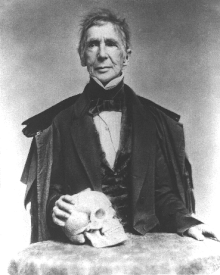John C. Warren
| John Collins Warren | |
|---|---|

Dr. John Collins Warren circa 1850
|
|
| Born |
August 1, 1778 Boston, United States |
| Died | May 4, 1856 (aged 77) Boston, United States |
| Nationality | American |
| Alma mater | Harvard Medical School |
| Known for | Ether anaesthesia |
| Scientific career | |
| Fields | Surgery |
John Collins Warren (August 1, 1778 – May 4, 1856), was an American surgeon. In 1846 he gave permission to William T.G. Morton to provide ether anesthesia while Warren performed a minor surgical procedure. News of this first public demonstration of surgical anesthesia quickly circulated around the world. He was a founder of the New England Journal of Medicine and was the third president of the American Medical Association. He was the first Dean of Harvard Medical School and a founding member of the Massachusetts General Hospital.
Born in Boston, he was the son of John Warren, well-known doctor, Harvard professor, and a founder of the Harvard Medical School and the nephew of Dr. Joseph Warren. He graduated from Harvard College in 1797, then began the study of medicine with his father. In 1799, he continued his medical studies in London and Paris and Edinburgh, including work with the pioneer anatomist Sir Astley Cooper (1768–1841). He graduated with an M.D. from the University of Edinburgh Medical School in 1801. On his return to America in 1802, Warren entered into partnership with his father and also assisted him with anatomical lectures, dissections, and demonstrations at Harvard Medical School. By 1806, Warren had begun performing cataract extractions for a condition which was most likely angle-closure glaucoma.
He was named Adjunct Professor of Anatomy and Surgery in 1806, then, at his father's death in 1815, assumed the Hersey Professorship of Anatomy and Surgery, which post he held until retirement in 1847. During this time, Warren played a leading role in establishing New England's first medical journal, The New England Journal of Medicine and Surgery (first issue January 1812), which subsequently evolved into today's New England Journal of Medicine. He was also active in the Anthology Club.
...
Wikipedia
